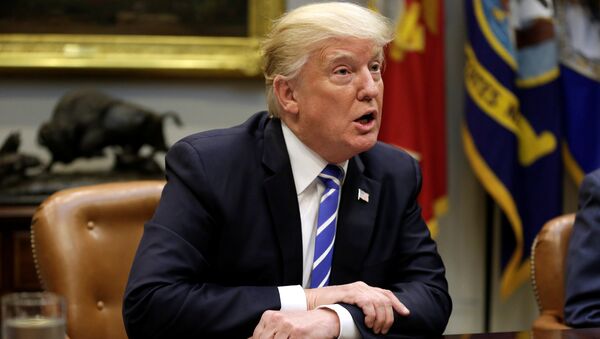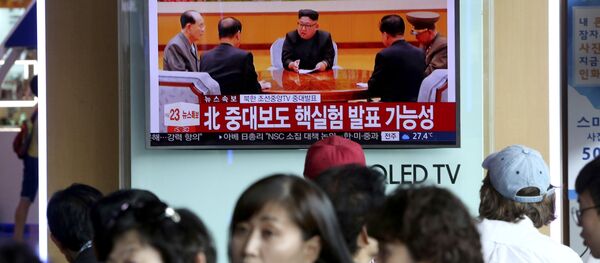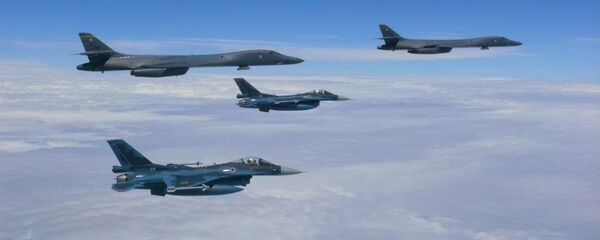On September 5, President Donald Trump announced via Twitter he will "allow" South Korea and Japan to "substantially" increase their purchases of US military equipment, in response to suggestions North Korea tested a hydrogen bomb.
I am allowing Japan & South Korea to buy a substantially increased amount of highly sophisticated military equipment from the United States.
— Donald J. Trump (@realDonaldTrump) September 5, 2017
A White House readout of a September 4 call between Trump and South Korean President Moon Jae-in suggests ensuing receipts could run into many billions of dollars.
Said to come in response to North Korea's reported test of a hydrogen bomb, the move could represent yet another potentially incendiary escalation of the tensions between the US and North Korea, which have been rapidly rising ever since Trump's inauguration.
The approach of the president's administration over 2017 is perhaps best encapsulated by his August promise to unleash "fire and fury like the world has never seen" if a conflict were to erupt between the two nations.
Trump's rhetoric has garnered much support among the US political class, and gone largely uncriticized in the international mainstream media.
Advocates for an aggressive stance on North Korea invoke Pyongyang's frequent provocative behavior, such as the government's threats to attack Guam, and repeated missile tests.
Hokkaido Test
One particularly controversial trial occurred August 28, when a Hwasong-12 intermediate-range ballistic missile was fired over Japan's Hokkaido Island.
The missile landed in the waters beyond the island, harming neither people nor property, but in an official statement, Trump believed the message to be "loud and clear."
"This regime has signaled its contempt for its neighbors, for all members of the United Nations, and for minimum standards of acceptable international behavior. Threatening and destabilizing actions only increase the North Korean regime's isolation in the region and among all nations of the world. All options are on the table," he said.
What Trump, and the mainstream media, failed to acknowledge was the test followed three weeks in which Japan, South Korea and the US engaged in large-scale joint-military drills on Hokkaido Island, and in South Korea.
North Korea 'Invasion' Games
These war games, which involved thousands of troops, simulated an invasion of North Korea, and a "decapitation" operation to remove the country's leaders from power.
Despite offers from North Korean leaders to end nuclear tests in return for terminating the exercises, NATO Deputy Secretary General Rose Gottemoeller has said the drills could not be "traded off" against DPRK nuclear tests.
The Hokkaido missile test was conducted mere hours after the war games ended, indeed sending a clear message that North Korea is ready, willing and able to defend itself against future foreign aggression.
Arguably, far from a provocation in itself, the missile test was a response to provocation.
More Drills
Much the same is true of the three tests of short-range ballistic missiles conducted the week after by North Korea.
These tests followed three separate week-long joint-military drills in South Korea, involving 75,000 combat troops, and hundreds of tanks, armored vehicles and landing craft, heavy artillery, a full naval flotilla and flyovers by squadrons of state of the art fighters and strategic bombers.
On August 30, a US-led flight-group of F-35B fighters, F-15 fighters and B-1B bombers conducted military operations over a training range east of Seoul.
The B-1Bs, low-altitude nuclear bombers, dropped dummy-bombs on the site before returning to base — in Guam.
Guam is second only to Pearl Harbor, Hawaii in importance to the US, and is one of two major US Navy facilities in the Pacific Ocean.
It's also expected that up to 20,000 marines from Japan's Okinawa will move to the naval base there in the future.
The presence of a potentially hostile military base not far from North Korea — a base that frequently dispatches military vehicles even nearer to North Korea, for the purposes of provocative drills, is almost entirely unacknowledged.
Need for Dialogue
The U.S. has been talking to North Korea, and paying them extortion money, for 25 years. Talking is not the answer!
— Donald J. Trump (@realDonaldTrump) August 30, 2017
The US' stance on North Korea has been criticized by some major US allies, such as Germany, as well as Russia and China.
Russia and China called on all parties to resume a dialogue and proposed a "double freeze" plan that would see North Korea stop nuclear tests and the US, Japan and South Korea cease all joint-drills.
While there are suggestions North Korea is ready to enter negotiations, Trump has made clear he believes talks will not resolve the issue.
Speaking at the September 5 BRICS conference, Russian President Vladimir Putin urged the US to enter dialog with Pyongyang — and said North Korea should not be afraid for its security.
"It is necessary to push the issue to a dialogue between all interested parties. All participants in this process, including North Korea, should not have any of these considerations that are associated with the threat of destruction, but, on the contrary, all parties to the conflict should get on the path of cooperation," he said






